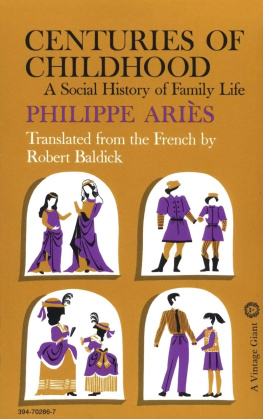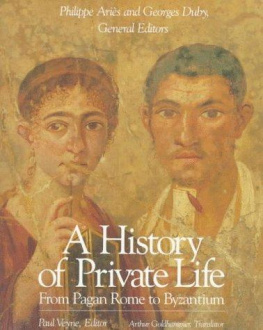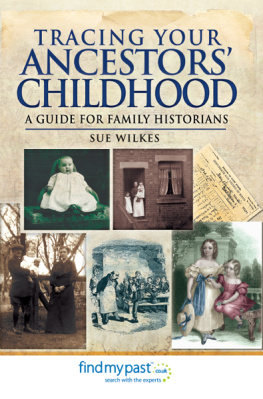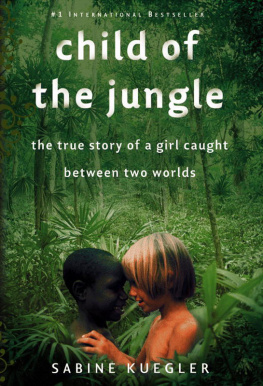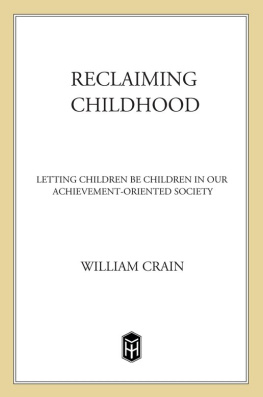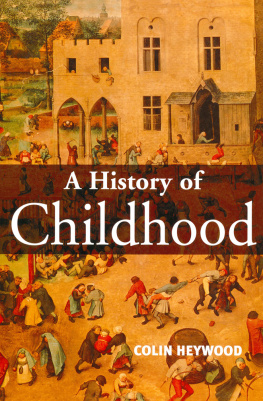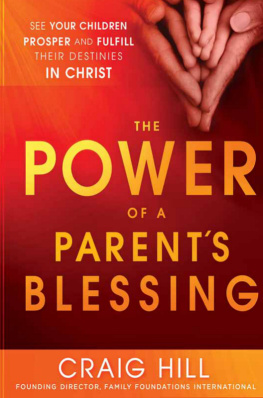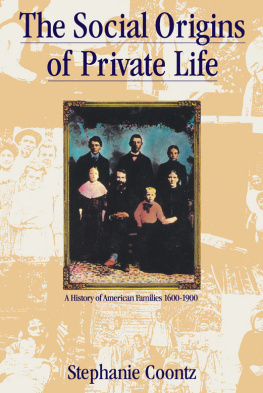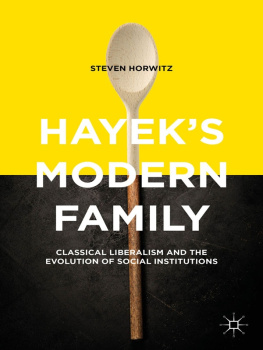PHILIPPE ARIS
CENTURIES OF
CHILDHOOD
A Social History of
Family Life
Translated from the French by
ROBERT BALDICK
New York: Alfred A. Knopf
1962
Translated from the French
L'Enfant et la vie familiale sous l'Ancien Rgime
1960 by Librarie Plon, Paris
English version 1962 by Jonathan Cape Ltd
Introduction
This book on the family under the ancien regime is not the work of a specialist in that period, but of a demographic historian who, struck by the original characteristics of the modern family, felt the need to go back into a more distant past to discover the limits of this originality. I must make it clear from the start that there is no question here of a gratuitous examination of society under the ancien regime. I have explained elsewhere but it must be used in the study of manners and feelings whose variations extend over a long period. This is the case with the family, with day-long, lifelong relations between parents and between parents and children.
But have we any right to talk of a history of the family? Is the family a phenomenon any more subject to history than instinct is? It is possible to argue that it is not, and to maintain that the family partakes of the immobility of the species. It is no doubt true that since the beginning of the human race men have built homes and begot children, and it can be argued that within the great family types, monogamous and polygamous, historical differences are of little importance in comparison with the huge mass of what remains unchanged.
On the other hand, the great demographic revolution in the West, from the eighteenth to the twentieth century, has revealed to us considerable possibilities of change in structures hitherto believed to be invariable because they were biological. The adoption of contraceptive measures has brought about both quantitative and qualitative changes in the family. However it is not so much the family as a reality that is our subject here as the family as an idea. True, men and women will always go on loving one another, will always go on having children, whether they limit their numbers or give free rein to instinct, and will always go on guiding the first steps of those children. That is not the question at issue. The point is that the ideas entertained about these relations may be dissimilar at moments separated by lengthy periods of time. It is the history of the idea of the family which concerns us here, not the description of manners or the nature of law.
In what direction is this idea evolving?
For a long time it was believed that the family constituted the ancient basis of our society, and that, startling in the eighteenth century, the progress of liberal individualism had shaken and weakened it. The history of the family in the nineteenth and twentieth centuries was supposed to be that of a decadence: the frequency of divorces and the weakening of marital and paternal authority were seen as so many signs of its decline. The study of modern demographic phenomena led me to a completely contrary conclusion. It seemed to me (and qualified observers have come to share my conclusions) that on the contrary the family occupied a tremendous place in our industrial societies, and that it had perhaps never before exercised so much influence over the human condition. The legal weakening proved only that the idea (and the reality) did not follow the same curve as the institution. Is not this disparity between living ideas and legal structures one of the characteristics of our civilization? The idea of the family appeared to be one of the great forces of our time. I then went on to wonder, not whether it was on the decline, but whether it had ever been as strong before, and even whether it had been in existence for a long time. I accordingly looked back into our past, to find out whether the idea of the family land not been born comparatively recently, at a time when the family had freed itself from both biology and law to become a value, a theme of expression, an occasion of emotions. The aim of this book is to reply to this question on the modernity of the idea of the family.
But how was I to discover, in the documents of the past, references to things which were too ordinary, too commonplace, too far removed from the memorable incident for contemporary writers to mention them? Our experience of the modern demographic revolution has revealed to us the importance of the childs role in this silent history. We know that there is a connection between the idea of childhood and the idea of the family. We were entitled to suppose that this connection also existed in a more distant past and to estimate one with the help of the other. That is why we are going to study them together.
In the tenth century, artists were unable to depict a child except as a man on a smaller scale. How did we come from that ignorance of childhood to the centering of the family around the child in the nineteenth century? How far does this evolution correspond to a parallel evolution of the concept people have of the family, the feeling they entertain towards it, the value they attribute to it? It will be no surprise to the reader if these questions take us to the very heart of the great problems of civilization, for we are standing on those frontiers of biology and sociology from which mankind derives its hidden strength.
P ART O NE
THE IDEA OF CHILDHOOD
I
THE AGES OF LIFE
A man of the sixteenth or the seventeenth century would be astonished at the exigencies with regard to civil status to which we submit quite naturally. As soon as our children start to talk, we teach them their name, their age and their parents name. We are extremely proud when little Paul, asked how old he is, replies correctly that he is two and a half. We feel in fact that it is a matter of importance that little Paul should get this right: what would become of him if he forgot his age? In the African bush, age is still quite an obscure notion, something which is not so important that one cannot forget it. But in our technical civilization, how could anyone forget the exact date of his birth, when he has to remember it for almost every application he makes, every document he signs, every form he fills in -and heaven knows there are enough of those and there will be more in the future. Little Paul will give his age at school; he will soon become Paul ---- of Form ----- and when he starts his first job he will be given, together with his Social Security card, a registration number which will double his own name. At the same time as being Paul ------ and indeed rather than being Paul. He will be a number, which will begin with his sex, the year of his birth, and the month of that year. A day will come when every citizen will have his registration number. Our civic personality is already more precisely expressed by the co-ordinates of our birth than by our surname. In time the latter might well not disappear but be reserved for private life, while a registration number in which the date of birth would be one of the elements would take its place for civic purposes. In the Middle Ages the Christian name had been considered too imprecise a description, and it had been found necessary to complete it with a surname, a place name in many cases. And now it has become advisable to add a further detail, the numerical character, the age. The Christian name belongs to the world of fancy, the surname to that of tradition. The age, a quantity legally measurable to within a few hours, comes from another world, that of precise figures. In our day our registration practices partake at the same time of all worlds.

